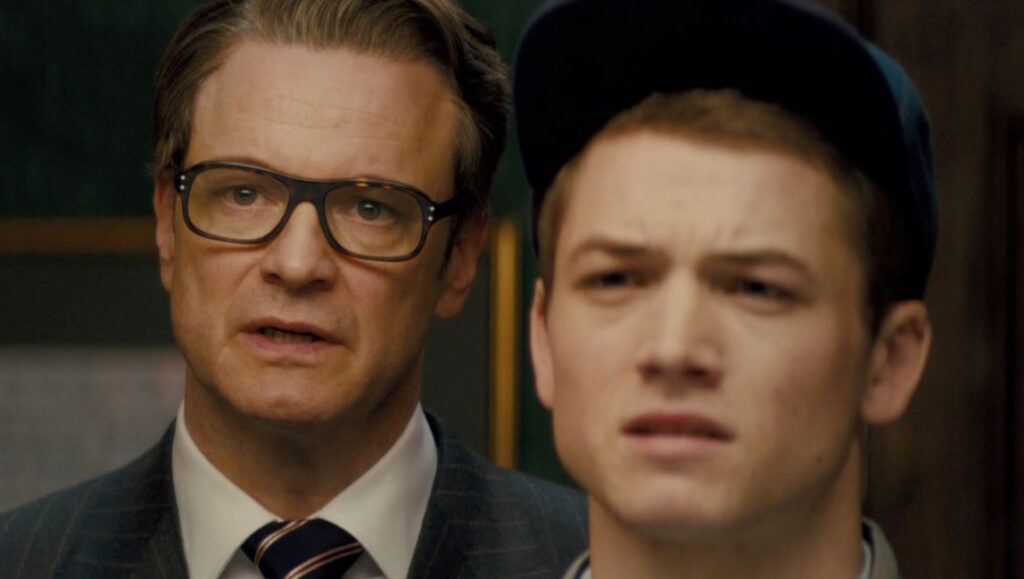Kinsman: The Secret Service is ostensibly both a rebuke to the increasingly self-serious spy genre and a tongue-in-cheek nod to the good old days of 007 in a tuxedo and megalomaniacs in super-fortresses. But is amping up the violence and suspect gender politics the most effective way to parody these well-worn tropes? The Bond films have been around for more than 50 years, and even if they’ve hewn to a basic formula of 007 saving the world and romancing sexy women, the individual entries themselves have vacillated wildly, from the trendsetting From Russia With Love to the overt camp of (the direly under-appreciated) Moonraker and beyond. How do you parody something that’s gone out of its way, for nearly five decades, to exhibit so many varying degrees of self-awareness? According to Vaughn, you just double down on the most obvious touchstones without much wit or elaboration. Samuel L. Jackson’s tech wizard bent on world domination? He’s got a funny lisp and wears what might actually be Jackson’s own clothes. The villain’s secret lair? It has its own nightclub. Colin Firth’s gentleman spy? Spends nearly the entire movie training some wiseass kid to be a secret agent. It’s about as much of a challenge to the Bond legacy (however long in the tooth it may be) as that risible Vin Diesel extreme-sports spy garbage XXX.
Even Vaughn’s action is dulled by its half-hearted attempt to be more modern. A mid-film sequence finds him single-handedly decimating a church full of brainwashed assailants, but it’s all displayed in a heavily CG-assisted faux single take, the camera diving all over the place as Firth gruesomely dispatches one attacker after another. It’s not a terrible sequence, but it pales in comparison with something like John Wick, which featured violence just as nasty, blood just as animated, and a camera just as untethered (and, it must be noted, Keanu Reeves in just as nice a suit), but with practical effects. What’s more, if this is an attempt to modernize and reinvigorate a tired genre, it has a curious conservative streak. The villain is a black, smugly liberal, vaguely gay-coded environmentalist, a threat to the status-quo if ever there was one, insidiously planning to destroy society by offering the sheeple free internet (even Obama is in on it). Our street punk protagonist has to prove himself over privileged recruits with prestigious educations; he bests them all only to ultimately realize the “power” of a Savile Row suit, literally referred to here as his suit of armor, and more figuratively about as clear a symbol of an ensconced moneyed aristocracy as you can get. For all its supposed irreverence, it seems to be suggesting that we, the unwashed masses, need a secret cabal of elite gentlemen to protect us from ourselves.
Amps up the violence and suspect gender politics of the Bond franchise it parodies.
Certainly the jokes haven’t been updated. Jackson’s lisp is only the tip of a massively unfunny iceberg. A climactic scene of dozens of exploding heads is presented with candy-colored CG clouds that wouldn’t be out of place in an Austin Powers movie. And while Bond’s gender politics have eternally been retrograde, Kingsman plunges into lad-mag misogyny. The villain’s henchwoman is just a stock tough babe, and the hero’s female counterpart has to wait outside during the finale. The movie even has the temerity to end on a joke in which a woman whose sole purpose is as a repeated punchline begs the hero to sodomize her in her prison cell. Given the incoherent working-class chip on this movie’s shoulder, it might as well be Vaughn’s stab at Swept Away. The Roger Moore Bond movies this directly references strained credulity in some of their love scenes, especially as Sir Roger got older, but they were never this smugly self-satisfied.

